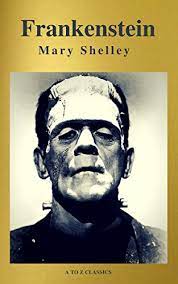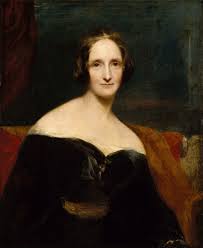Frankenstein Page #9
Frankenstein; or, The Modern Prometheus is an 1818 novel written by English author Mary Shelley. Frankenstein tells the story of Victor Frankenstein, a young scientist who creates a sapient creature in an unorthodox scientific experiment
My departure for Ingolstadt, which had been deferred by these events, was now again determined upon. I obtained from my father a respite of some weeks. It appeared to me sacrilege so soon to leave the repose, akin to death, of the house of mourning and to rush into the thick of life. I was new to sorrow, but it did not the less alarm me. I was unwilling to quit the sight of those that remained to me, and above all, I desired to see my sweet Elizabeth in some degree consoled. She indeed veiled her grief and strove to act the comforter to us all. She looked steadily on life and assumed its duties with courage and zeal. She devoted herself to those whom she had been taught to call her uncle and cousins. Never was she so enchanting as at this time, when she recalled the sunshine of her smiles and spent them upon us. She forgot even her own regret in her endeavours to make us forget. The day of my departure at length arrived. Clerval spent the last evening with us. He had endeavoured to persuade his father to permit him to accompany me and to become my fellow student, but in vain. His father was a narrow-minded trader and saw idleness and ruin in the aspirations and ambition of his son. Henry deeply felt the misfortune of being debarred from a liberal education. He said little, but when he spoke I read in his kindling eye and in his animated glance a restrained but firm resolve not to be chained to the miserable details of commerce. We sat late. We could not tear ourselves away from each other nor persuade ourselves to say the word “Farewell!” It was said, and we retired under the pretence of seeking repose, each fancying that the other was deceived; but when at morning’s dawn I descended to the carriage which was to convey me away, they were all there—my father again to bless me, Clerval to press my hand once more, my Elizabeth to renew her entreaties that I would write often and to bestow the last feminine attentions on her playmate and friend. I threw myself into the chaise that was to convey me away and indulged in the most melancholy reflections. I, who had ever been surrounded by amiable companions, continually engaged in endeavouring to bestow mutual pleasure—I was now alone. In the university whither I was going I must form my own friends and be my own protector. My life had hitherto been remarkably secluded and domestic, and this had given me invincible repugnance to new countenances. I loved my brothers, Elizabeth, and Clerval; these were “old familiar faces,” but I believed myself totally unfitted for the company of strangers. Such were my reflections as I commenced my journey; but as I proceeded, my spirits and hopes rose. I ardently desired the acquisition of knowledge. I had often, when at home, thought it hard to remain during my youth cooped up in one place and had longed to enter the world and take my station among other human beings. Now my desires were complied with, and it would, indeed, have been folly to repent. I had sufficient leisure for these and many other reflections during my journey to Ingolstadt, which was long and fatiguing. At length the high white steeple of the town met my eyes. I alighted and was conducted to my solitary apartment to spend the evening as I pleased. The next morning I delivered my letters of introduction and paid a visit to some of the principal professors. Chance—or rather the evil influence, the Angel of Destruction, which asserted omnipotent sway over me from the moment I turned my reluctant steps from my father’s door—led me first to M. Krempe, professor of natural philosophy. He was an uncouth man, but deeply imbued in the secrets of his science. He asked me several questions concerning my progress in the different branches of science appertaining to natural philosophy. I replied carelessly, and partly in contempt, mentioned the names of my alchemists as the principal authors I had studied. The professor stared. “Have you,” he said, “really spent your time in studying such nonsense?” I replied in the affirmative. “Every minute,” continued M. Krempe with warmth, “every instant that you have wasted on those books is utterly and entirely lost. You have burdened your memory with exploded systems and useless names. Good God! In what desert land have you lived, where no one was kind enough to inform you that these fancies which you have so greedily imbibed are a thousand years old and as musty as they are ancient? I little expected, in this enlightened and scientific age, to find a disciple of Albertus Magnus and Paracelsus. My dear sir, you must begin your studies entirely anew.” So saying, he stepped aside and wrote down a list of several books treating of natural philosophy which he desired me to procure, and dismissed me after mentioning that in the beginning of the following week he intended to commence a course of lectures upon natural philosophy in its general relations, and that M. Waldman, a fellow professor, would lecture upon chemistry the alternate days that he omitted. I returned home not disappointed, for I have said that I had long considered those authors useless whom the professor reprobated; but I returned not at all the more inclined to recur to these studies in any shape. M. Krempe was a little squat man with a gruff voice and a repulsive countenance; the teacher, therefore, did not prepossess me in favour of his pursuits. In rather a too philosophical and connected a strain, perhaps, I have given an account of the conclusions I had come to concerning them in my early years. As a child I had not been content with the results promised by the modern professors of natural science. With a confusion of ideas only to be accounted for by my extreme youth and my want of a guide on such matters, I had retrod the steps of knowledge along the paths of time and exchanged the discoveries of recent inquirers for the dreams of forgotten alchemists. Besides, I had a contempt for the uses of modern natural philosophy. It was very different when the masters of the science sought immortality and power; such views, although futile, were grand; but now the scene was changed. The ambition of the inquirer seemed to limit itself to the annihilation of those visions on which my interest in science was chiefly founded. I was required to exchange chimeras of boundless grandeur for realities of little worth.
Translation
Translate and read this book in other languages:
Select another language:
- - Select -
- 简体中文 (Chinese - Simplified)
- 繁體中文 (Chinese - Traditional)
- Español (Spanish)
- Esperanto (Esperanto)
- 日本語 (Japanese)
- Português (Portuguese)
- Deutsch (German)
- العربية (Arabic)
- Français (French)
- Русский (Russian)
- ಕನ್ನಡ (Kannada)
- 한국어 (Korean)
- עברית (Hebrew)
- Gaeilge (Irish)
- Українська (Ukrainian)
- اردو (Urdu)
- Magyar (Hungarian)
- मानक हिन्दी (Hindi)
- Indonesia (Indonesian)
- Italiano (Italian)
- தமிழ் (Tamil)
- Türkçe (Turkish)
- తెలుగు (Telugu)
- ภาษาไทย (Thai)
- Tiếng Việt (Vietnamese)
- Čeština (Czech)
- Polski (Polish)
- Bahasa Indonesia (Indonesian)
- Românește (Romanian)
- Nederlands (Dutch)
- Ελληνικά (Greek)
- Latinum (Latin)
- Svenska (Swedish)
- Dansk (Danish)
- Suomi (Finnish)
- فارسی (Persian)
- ייִדיש (Yiddish)
- հայերեն (Armenian)
- Norsk (Norwegian)
- English (English)
Citation
Use the citation below to add this book to your bibliography:
Style:MLAChicagoAPA
"Frankenstein Books." Literature.com. STANDS4 LLC, 2025. Web. 22 Jan. 2025. <https://www.literature.com/book/frankenstein_1446>.




Discuss this Frankenstein book with the community:
Report Comment
We're doing our best to make sure our content is useful, accurate and safe.
If by any chance you spot an inappropriate comment while navigating through our website please use this form to let us know, and we'll take care of it shortly.
Attachment
You need to be logged in to favorite.
Log In